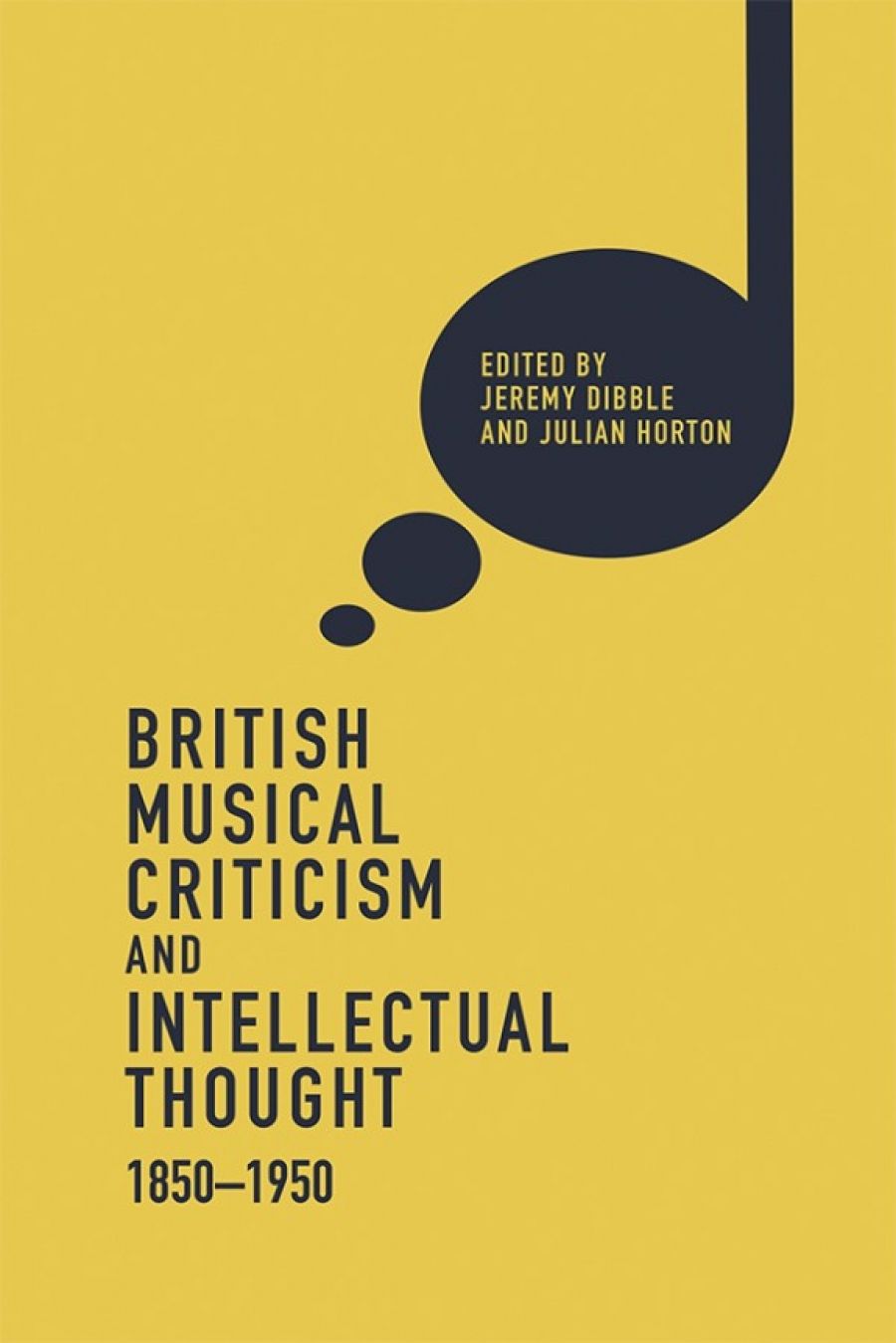
- Free Article: No
- Contents Category: Music
- Custom Article Title: Peter Tregear reviews 'British Music Criticism and Intellectual Thought 1850–1950' edited by Jeremy Dibble and Julian Horton
- Review Article: Yes
- Online Only: No
- Custom Highlight Text:
When the German social commentator Oscar A.H. Schmitz described England as ‘Das Land ohne Musik’ [The Country without Music], the insult stuck. Its veracity arose not because the English lacked a vibrant musical culture, or a lively intellectual class prepared to engage with what they were hearing. Rather, it was because Schmitz ...
- Book 1 Title: British Music Criticism and Intellectual Thought 1850–1950
- Book 1 Biblio: Boydell Press, $119 hb, 390 pp, 9781783272877
A common interest shared by all the critics examined here is a concern to convey their value judgements about music not just in terms of entertainment value but also in terms of its capacity to instruct. Just what sort of instruction music could provide remains, however, heavily contested. The advocacy of a ‘common sense’ approach to music aesthetics is one peculiarity that shaped the writings and music of composer–critics like Ralph Vaughan Williams and Herbert Howells. Peter Horton’s opening chapter demonstrates, similarly, how an attraction towards the ‘rule-based’ music of Felix Mendelssohn established a long-standing opposition in British music between those who favoured Mendelssohn and Brahms and those inclined towards the so-called ‘New German School’ of Berlioz, Liszt, and Wagner.
By the mid-1850s, Wagner himself was appearing as a conductor in London, and by the 1870s a serious pro-Wagner lobby had emerged. Harry White’s chapter on Shaw discusses The Perfect Wagnerite (1898), among his other writings and how he believed that music could, and indeed should, act both ‘as an agent of social reform, and as a vital amplification of speech’. White is not afraid to criticise the critic; at one point he remarks that Shaw’s music criticism conveys the ‘unfortunate … impression of a sententious and strident bore’.
Bennett Zon’s chapter on ‘Spencer, Sympathy and the School of Music Criticism’ reveals another broader intellectual and social context that lay behind much music criticism at this time by focusing on the influence of evolutionary theory. For critic Herbert Spencer (1820–1903), the ‘fittest pieces’ of music were ‘the most emotionally refined and ultimately poetical’. These works were thus best suited for arousing our sympathetic imagination, which served in turn to strengthen our species’ capacity for ‘co-operation and mutual helpfulness’.
Philip Ross Bullock’s chapter on ‘Russia and Eastern Europe’ is a particularly welcome inclusion for showing how ‘geopolitical concerns’ impinged upon discussions of culture and the arts of this time, and for drawing attention to the prominent role women played in shaping some of these discussions. Grounded in her long-standing interest in the music of Eastern Europe (among other achievements, she published the first biography of Tchaikovsky in any language), the music criticism of Rosa Newmarch (1857–1940) ‘came to exercise a social function that far exceeded its original cultural aspirations’, especially when Britain found itself allied to Russia at the onset of World War I.
That war, however, also served to heighten a commonly held scepticism of musical radicalism, especially that which was emanating from Austria and Germany. Howells (best-known today perhaps for his Anglican liturgical music) emerges in Jonathan Clinch’s essay as polemicist for an English modernism grounded not so much in reason as in reasonableness: ‘music lives in its sounds, not its theories’, he declared. It was only after World War II that British musical life, like so much else, became open to a more profound transformation from both Europe and America. In the case of music criticism, this was enhanced by the arrival of émigré musicians who had fled Nazi Germany. This volume ends with a chapter by Patrick Zuk on perhaps the best-known music critic among them, Hans Keller (1919–85). The chronological boundary of 1950 restricts Zuk’s examination of Keller to an exposition only; it also excludes any engagement with the impact on such critics of the rise of rock and pop music.
In any case, as Christopher Mark suggests in his examination of Constant Lambert’s colourful and acerbic Music Ho! A study of music in decline (1934), we now live in an age where ‘description is preferred to critical engagement’. Yet music criticism can still be, he asserts, ‘a form of knowledge – in the sense of comprehension, grasp, grip, command, mastery, apprehension – that might be pursed with profit’. If he’s right, this volume proffers a welcome insight into, if not inspiration for, what such criticism at its best can be, and do.


Comments powered by CComment